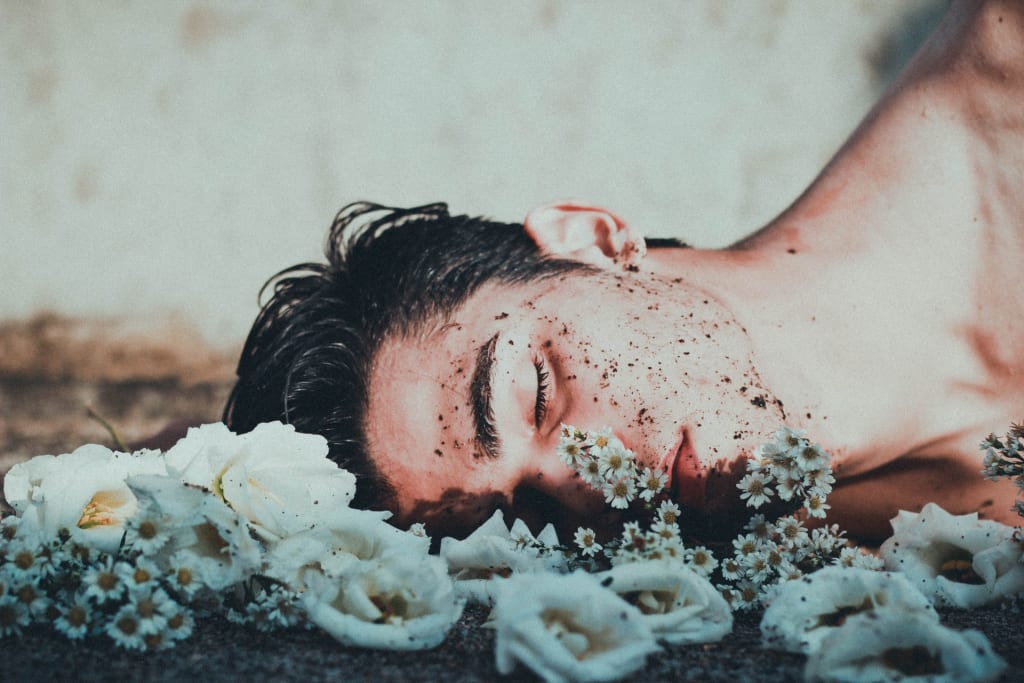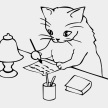Bury Me in the Garden Where Roses Once Bloomed
A Quiet Tale of a World Unwinding

As I sit by Thaniel’s bedside, I watch the slow up-and-down rhythm of his chest. Sometimes I lose sleep just for keeping track of his breathing. Each breath is another flicker of hope that I will have him for another day.
The cough that rattles through his chest worries me, but there are no hospitals for miles. Even medicine—what we were able to barter for from the last nomads to travel in packs past our farmhouse—is scarce, a high commodity. I used the last of the painkillers and sedatives for him last week.
I know I am watching his last moments as they collect in the bottom of the hourglass. I know there is no last-ditch effort that will save him. And I know the sickness will get me too eventually.
“Quent,” he says, reaching out for me even though his eyes are still shut. I grab hold of his hand and feel like I’m drowning with no hope of survival.
“What is it, Than?” I ask, trying to keep my voice soft so as not to rile him. Last week, he was caught in such delirium that he almost fell out of the bed I’d tried to make as comfortable as possible for him.
“Do you still dream?” he asks, and I can tell when he opens his eyes that fog has clouded over his vision. That’s one of the final symptoms of the sickness. I learned from the emergency broadcasts on the radio. But there’s no one here to help. No one here to intervene. No one to provide a miracle.
When I wake up tomorrow, it could be his last day. And then what will I do? What world have I known without Thaniel, the farm, and the garden that once flourished before the changing climates destroyed our handle of the growing seasons?
I run a finger down his cheek. “I dream of better days,” I say, my voice a whisper just in case he falls back into his restless sleep. But a vague smile crosses his lips.
“I had such a nice dream,” he says, and even from his voice I can tell he is still lost in some other world that may be kinder than the one we’ve known these last few months.
“What was it about?” I ask. Maybe it’s something that will cheer us both up.
The silence balloons, so long that I think he has really fallen back into dreams, but then I realize he’s crying.
“I can’t remember,” he says. “Quent, why can’t I remember?”
I run a hand across his temple and against his thinning hair. “Shh, shh, it’s okay, Than. Just don’t dwell on it.”
Eventually his breathing settles back into something resembling normalcy. But I know that I’m losing my grasp on him. Any day now, and there will be nothing left.
*
We thought we were safe because we lived on the farm, and our neighbors lived miles away.
We thought our last sanctuary would sustain us, no matter what wars existed on other coasts or what challenges the rest of this tiny planet faced.
We thought our own little universe would never crumble until the day we were gray and old.
We thought the first transmissions were media propaganda because the government had lied to us before.
We thought the sickness was no way a threat to the lives we were pursuing in our worry-free sphere.
We thought it was just another scare—just like all the other times.
But then Thaniel developed a cough.
And from there the life we knew slowly unraveled.
*
The cities were burning, one by one, and Thaniel wouldn’t go to a hospital anyway.
“We don’t have any money,” he said, even as his cough worsened where it would disrupt every single night’s sleep. And soon enough I wasn’t sleeping either. The dawn always came far too soon.
“Maybe we can go to the next town over,” I said, trying not to plead with him. Thaniel was stubborn, but he especially kept rooted when he sensed I was crossing over into what he called “an illogical phase.”
“And what? They won’t let me come home. They’ll isolate me, and then I may die before I ever see you again.”
“You don’t know that.”
“You don’t know if they can even help me. And when has the system ever helped without taking something back in return?”
I don’t want you to die, I thought, but I knew those words would be the point of no return.
“We need to do something,” I said.
“We need to live,” Thaniel said. “Now, come on, let’s see what we can do in the fields today.”
And so we began to live a lie right then, avoiding the greater cloud ready to storm over our heads.
*
Thaniel’s breathing rattles in a way that tells me he has fluid in his lungs. He’s only thirty, yet he looks like old photos I once saw of prisoners of war in school—men aged and thinned far before their time.
“Quent.”
My name from his lips startles me awake from the daze I’d been in. “Yeah, Than?” I ask, and he takes hold of my hand.
“I should have listened to you,” he says.
And the look he casts in my direction—my heart starts to break itself to pieces.
“Don’t talk like this is goodbye,” I respond, even as tears begin to make me blink faster. If I cry in front of him, then there really is no hope left.
“Bury me in the garden,” he says, each word careful and slow, and I just stare at him.
“Thaniel, don’t—”
“Bury me in the garden. Under the rose bush. Maybe then you’ll see roses next summer.”
Garden. Roses. Summer. Such innocuous words that don’t belong in this world we’re living in now.
I squeeze his hand, and I feel almost every bone under his frail skin. “Maybe you’ll see the roses too,” I say. “You don’t know what will happen.”
Thaniel coughs, the sound filled with phlegm, and the matter drops for the moment.
It’s another sleepless night.
*
When I’m sitting out on the porch one evening while Thaniel tries to sleep, I see a group coming through the dirt path on foot. The rifle in my lap is the only security I feel.
“Doing all right?” I call, and the leader—a woman with short curly hair and brown skin—eyes me warily. I try not to notice that she’s the oldest; the other three are kids barely out of their teens.
“When’s the last time you saw anyone?” she asks.
“A few weeks back.”
“Can you spare any bottles of water?”
“I don’t have any bottles, but you can fill up any canteens you have in the well out back.”
“Thanks.” She gestures to the kids, all who keep their eyes trained on where my rifle is at all times.
While the kids go to the well, the girl stands sentinel in front. “You alone?”
Maybe I should be paranoid, but what have I got to lose? Thaniel’s dying. And I may follow soon enough. “Got a contamination,” I say. “He hasn’t got long now.”
Something crosses the girl’s face, and I almost think it’s sorrow. “I’m sorry,” she says. “It got my parents too. All we got was a cough for a few days.”
“Same here,” I say.
The girl looks ready to say something else, but the kids return with their refilled canteens. She nods in my direction. “Thanks for the water.”
“No problem,” I say. Then, because the radio has been replaying the same transmissions for days, I add, “Any news from the outside?”
The girl seems to hesitate before she says, “It’s not getting any better. They’re saying the end times are here.”
“Kinda what I figured,” I say. It’s almost a relief to hear the words from someone else.
“They’re sending people up into space,” the girl says, “but everyone else—we’re on our own. Nobody’s coming to save us.”
I swallow a lump in my throat. “Not surprising, I guess.”
“Yeah.” Then her eyes settle on the house beyond me. “Good luck.”
I know she means more than just the impending demise of what’s left of humanity. “You too.”
The girl and her siblings—I assume—leave me, and my eyes trail after them in the dark for a long while. But then I hear coughing inside and go back to the only person who is keeping me tethered to this soon-to-be-lost world.
*
It happens in what feels like a flash—but then, looking back, I’ll probably feel like it was happening in slow motion.
Thaniel can't stop coughing.
Blood spots the sheets.
His skin bears a blue sheen that makes him look bruised all over his body.
His entire form trembles from the chills of the fever that had spiked from yesterday.
No matter how I talk to him in a soothing voice, he never responds in all the hours I sit by his bedside.
His clouded eyes dim one last time as they stare up at the cracked ceiling.
I say his name over and over and over, and it takes me moments to realize he’s already gone.
Then the tears overtake everything else.
*
I start to shovel before dawn hints at the horizon. Thaniel’s body is wrapped in bundles of sheets, and it took me almost an hour to move his body from the house to the remains of our garden out front.
I don’t know how long I move pile of dirt after pile of dirt, but by the time I’ve made a deep enough hole my back aches and my forehead beads with sweat.
First goes the body—if I think of it as Thaniel, I may start to weep again.
Next goes the box of mementos—pictures from better times, a heart-shaped locket he inherited from his mother, the ring I bought him when we were twenty in a vibrant world that seemed so far from the edge of collapsing.
And then the dirt is replaced, as if there’s nothing amiss, and I wonder if I’ll be here a year from now to see if the roses start to bloom anew.
The world may not even last long enough for roses.
I close my eyes, the sun too warm on my face, and imagine a garden that would make Thaniel happy.
I’ll probably die here alone in this little farmhouse.
I may see the end of the world happen from my front porch.
All I have left are the memories to keep me sane—and the hope of roses in bloom.
About the Creator
Jillian Spiridon
just another writer with too many cats
twitter: @jillianspiridon






Comments
There are no comments for this story
Be the first to respond and start the conversation.